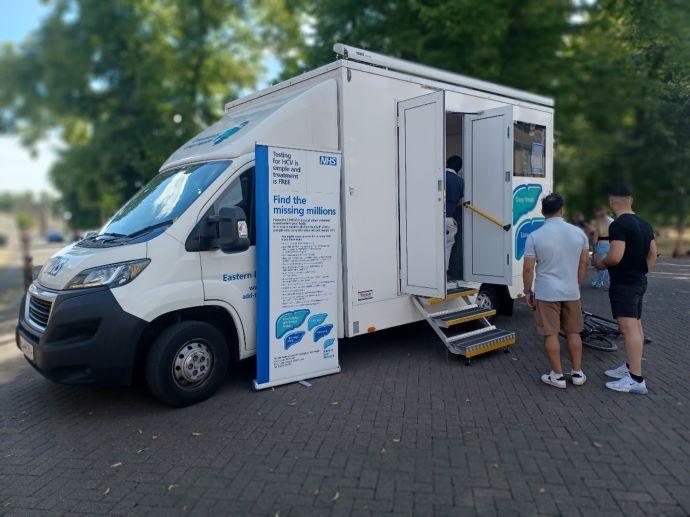As part of a national campaign, Cambridge University Hospitals NHS Foundation Trust (CUH) is co-ordinating rapid testing, liver scanning and treatment across the region.
This enables people to get quick, convenient testing, near to where they live as well as reaching at-risk people who may find it difficult to travel long distances to hospital-based services.
It’s spearheaded by a community van and specialist team, visiting community clinics and support groups, town centres, places of worship, drug and alcohol services, probation services and prisons.
Both testing and treatment has improved in recent years, with no need for liver biopsies and injections. Testing usually involves a finger prick test or mouth swab. Treatment is easy to take and accessible, involving 8-12 weeks of tablets with few or no side effects and a 96% cure rate.
Hepatitis C is a blood borne virus (goes from blood to blood). Transmission can be through; old/homemade tattoos/piercings, current/past drug use (sniffed and injected), anal sex, blood transfusions before 1991 and healthcare abroad (see more details below).
The virus goes in to the liver cells and replicates itself, which over several years can cause serious liver scarring and complications. With a lack of clear symptoms, people can be infected with hepatitis C and go undiagnosed for many years. If left too long, the virus can cause fatal liver damage and possibly lead to liver cancer.
The NHS has an ambitious plan to eliminate hepatitis C from England before the global goal of 2030. It’s estimated tens of thousands of people are still infected country-wide and tracking these people down is key to eliminating the virus.
A multidisciplinary team is involved in this mission, including former patients who work as peer advocates, nurse specialists, social and outreach workers, radiographers and expert technicians, all working to find, treat and cure patients.
Last year the team tested 2,729 people and 509 started treatment. Since April this year, 903 people have been tested and 216 have started treatment, an increase so far year on year.
John Wortley runs the eastern region hepatitis C Operational Delivery Network for CUH. He says:
“Reaching our targets in Wisbech and Grays is the result of a huge team effort. To keep the virus at bay we will need to keep monitoring those areas for re-infection, but as things stand, we’ve achieved our goal and eliminated hep C from those communities. Our mission now is to do the same across the region, with many areas on track to achieve this.
“No matter who you are, where you are, or what your personal situation is, there is support to ensure that you can get tested and treated for hepatitis C.”
Rachael Bates is a clinical nurse specialist and works on the community van. She says:
“Eliminating hepatitis C is key to improving the health of both individuals and the wider community. It promotes peoples long-term health, improves their quality of life, and reduces the risk of developing major illnesses.”
See video clip of Rachael giving more information about the hep C service here:
Hep C | Rachael (no subtitles) - YouTube
In Wisbech in Cambridgeshire, Selena White runs a local community clinic which is part of the CUH hepatitis C service. She says it’s crucial to raise awareness of hepatitis C and break the stigma it carries. She says:
“In rural Wisbech and Fenland, we have gone the extra mile to visit service users in the community to complete testing. The impact we see when service users test positive is heartfelt and with support from the CUH team, we can deliver treatment within our clinic, where patients feel comfortable.
“Once treatment is completed, we truly feel we have helped deliver life-changing care.”
56 year old Mark Brunning was treated by the team for hepatitis C 5 years ago, having lived with the virus for around 20 years. He became infected as a drug user and was diagnosed but struggled to access effective testing and treatment. He now works as a patient advocate for the service. He says:
“I’ve seen friends die of hepatitis C. They didn’t get the treatment they needed, mainly because it wasn’t accessible enough and they didn’t get the right support. That’s changed now, and this service is going out of its way to find those people and offer them lifesaving care.
“My message is simple; get tested, get treated, get cured.”
See video clip of Mark talking about the impact of hep C:
Hep C | Mark (no subtitles) - YouTube
Charlotte Brown is Peer Co-ordinator in the eastern region for the UK charity, The Hepatitis C Trust. She says:
“The Hepatitis C Trust’s peer-to-peer support programme involves staff and volunteers with lived experience of the virus engaging with others at risk of and living with hepatitis C and encouraging and supporting them to get tested and treated. This shared lived experience is often crucial for engaging people who are less likely to engage with healthcare services.
“By working closely with our colleagues in the NHS, we are making progress towards eliminating the virus within the next few years.”



